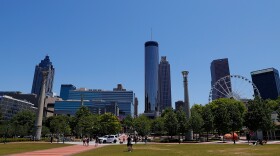
Nathan Rott
Nathan Rott is a correspondent on NPR's National Desk, where he focuses on environment issues and the American West.
Based at NPR West in Culver City, California, Rott spends a lot of his time on the road, covering everything from breaking news stories like California's wildfires to in-depth issues like the management of endangered species and many points between.
Rott owes his start at NPR to two extraordinary young men he never met. As the first recipient of the Stone and Holt Weeks Fellowship in 2010, he aims to honor the memory of the two brothers by carrying on their legacy of making the world a better place.
A graduate of the University of Montana, Rott prefers to be outside at just about every hour of the day. Prior to working at NPR, he worked a variety of jobs including wildland firefighting, commercial fishing, children's theater teaching, and professional snow-shoveling for the United States Antarctic Program. Odds are, he's shoveled more snow than you.
-
More frequent and severe wildfires and hurricanes have caused billions of dollars of damage in the U.S. Climate experts warn the costs to the economy and to individual families are only rising.
-
Wildfires have led to Oregon having the world's worst air quality, and the smoke is now moving east. Researchers say there's evidence that prolonged exposure to it can have a long-term health impact.
-
In another record-breaking year, communities are realizing the best way to survive wildfires is learning to live with them.
-
Human activities are causing an "unprecedented" and alarming decline in wildlife populations around the world, a new report warns. It says the staggering loss ultimately threatens human life as well.
-
Firefighting alone may never be enough to control extreme fires in the era of climate change. Acknowledging this reality, some communities are trying to remake themselves to be fire resistant.
-
Hurricanes, wildfires, heat waves and disease outbreaks are all a preview of our hotter future. Dramatically cutting greenhouse gas emissions would help.
-
Any visitors to the national park are getting blunt advice: "Travel prepared to survive." It's part of a heat wave that is forcing rolling blackouts in the West.
-
Temperatures topped triple digits in parts of the state, and the weather is expected to remain blistering well into next week, likely putting more pressure on the electric utilities.
-
Visits to Yellowstone National Park are higher than last year as Americans look to escape their pandemic confines. Their business is welcome relief, despite worries they'll also bring coronavirus.
-
Power shut-off moratoriums imposed at the start of the pandemic are beginning to expire. Customers and utilities face a backlog of missed bills that may eventually be passed on to ratepayers.








